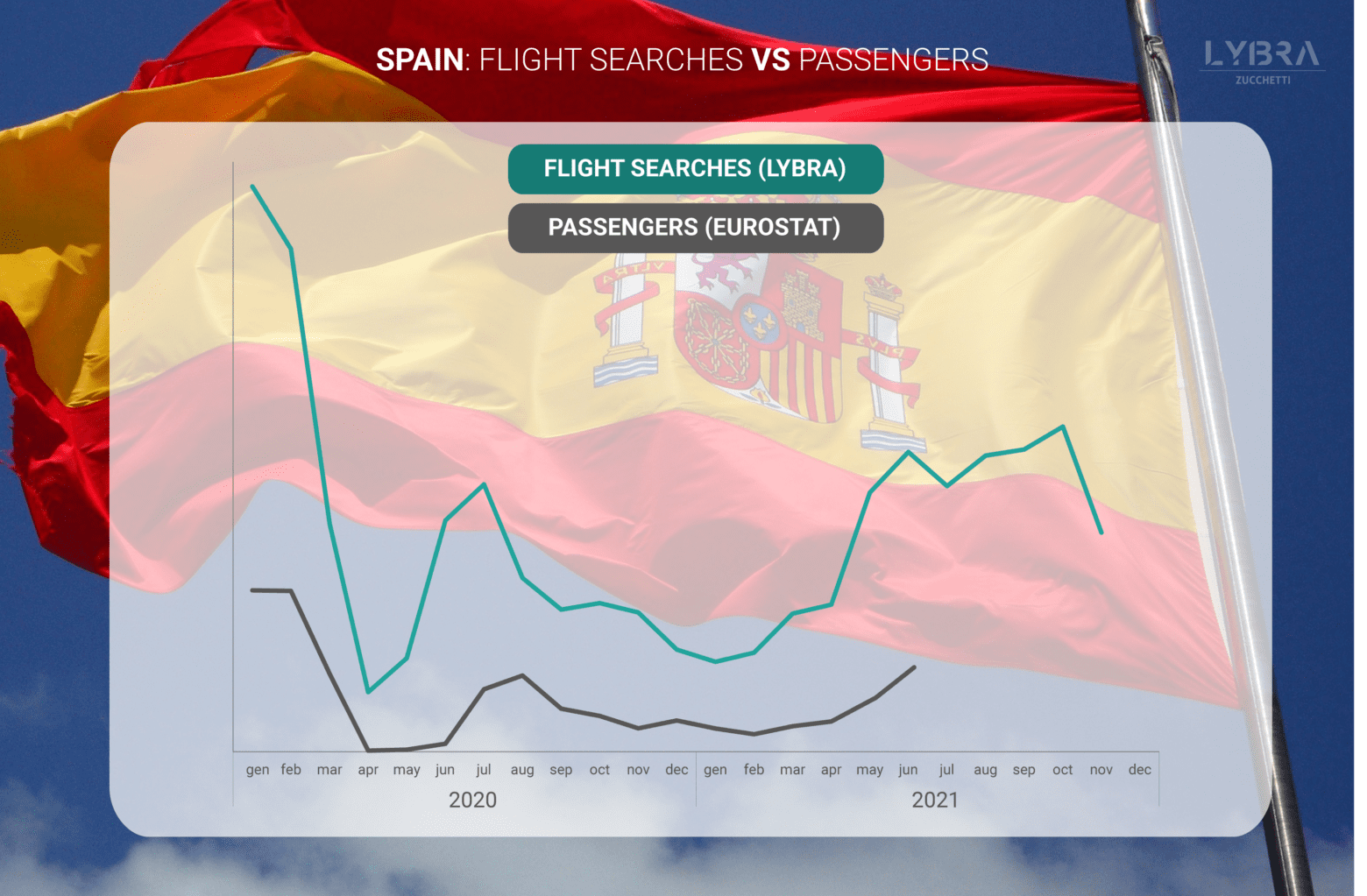From the beginning of 2020 to today, the air transport market – like the entire tourism sector – has been very erratic, overcome by the spread of the pandemic around the world. Like other EU countries, Spain has suffered the ups and downs of demand, without finding any stable ground.
In this article, we will examine the changes in the tourism market in Spain over the past 1.5 years, to determine how demand for air travel has changed, using two types of data: flight search data (Source: Lybra) and data on actual passengers carried (Source: Eurostat). These two data sets are not directly comparable for many reasons but, primarily, because we are comparing big data (flight searches) and small data (stats on passengers carried), which is like comparing apples and oranges. In addition, the ways in which data are collected by each source differs, and the frequency in which each refreshes their data also differs. Nevertheless, both of these sources collect and provide valuable information, which, when combined, give a clearer picture into two important phases of a traveler’s journey to Spain: the flight searches (which establish travel intention), and the actual passenger booking/departure. Pre-COVID, these data sets could be very useful in establishing a trend and a future forecast but, today, they can be used to judge how travellers have behaved and how they have reacted to the shifting periods of restrictions throughout the pandemic.
As can be seen from the graph, the search curve is always higher than the departure curve; it is normal to do more than one search before buying a ticket (although there are those who only do one search and then book immediately, but they are the minority), and even then, only a percentage of the searchers will continue to booking a flight. Another noteworthy fact is the slump in March 2020 and the small recovery in the summer, which was a common trend in most European tourist destinations.
Before the outbreak of the pandemic, the ratio of searches to passengers carried was 3:1; in January and February 2020, 90.9 million flight searches were made but only 27.3 million people traveled to Spain. The ratio increased sharply (to be even more heavily weighted on flight searches) during the first lockdown; people were not allowed to travel due to tight mobility restrictions, but the desire remained strong, so people were still searching for flights. During April and June 2020, the ratio of searches to passengers rose to 44:1, before settling at 4:1 in July. In July 2020, the Spanish health situation worsened again, making it necessary to bring back restrictions, effectively curbing tourism until the summer of 2021.
For the summer of 2021, the Eurostat data is only available until the end of June, so although we can notice a slight increase in passengers, we cannot yet assess the results or establish a trend, based on this data alone; conversely, Lybra’s flight search data – which is updated in real-time – shows that the demand curve increased significantly and remained up until October 2021, thanks in part to the spread of vaccines and the adoption of certification measures that allowed tourists to travel safely. Due to the discovery of the new strain of COVID, and the increased concern over the possibility of contagions due to travel, we saw another decrease in searches in November 2021 (down by 32.6%, compared to October) but we do not yet know if this decrease will stabilize to confirm a trend. We will be able to establish a longer-term trend by the end of the year, as we see the holiday season play out.
About Destination
Destination is a market intelligence project created by Lybra – developers of the most complete, machine learning, data-centric Revenue Management System (RMS) available on the market – to share real-time, region-specific statistics, information and trends in the world of tourism.
Every day, Lybra analyzes millions of datasets – data collected from thousands of hotels’ PMS and flight search data from a leading metasearch booking engine – to help hoteliers “look ahead to better understand the present;” in other words, Lybra helps hoteliers understand the upcoming demand for their destination and gives them the revenue management tools and actionable insights necessary, to maximize bookings and revenue.
The aim of Destination is to give hoteliers and DMOs a more expansive view of tourism news and trends in different regions around the world. Destination produces weekly Travel Demand Reports, which share tourism developments for a specific country/region and analyze how the region’s travel news has impacted tourist demand. Follow Destination on LinkedIn to gain access to the upcoming Travel Demand Reports, which are published every Tuesday.










